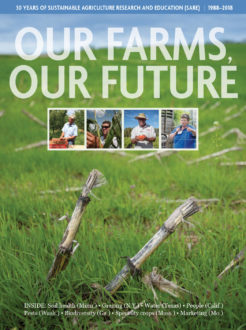Across the country, the farmer population is aging and the number of new farmers is shrinking. Compared to their male counterparts, fewer women are principal farm operators and they earn less. Minorities are farming in greater numbers but likewise have below-average incomes. Overall, the number of farms and farmland acreage are both steadily declining.
Farmers and their land are an integral part of the social fabric in communities across the country, so these trends matter to us all. Since 1988, SARE grantees have studied ways to advance the social dimension of sustainability. Some address the unique needs of particular farmer groups such as women farmers or those with limited resources. Some improve quality of life. Others strengthen the connection between farmers and their local communities.
For example, SARE-funded organizations provide valuable education and assistance to beginning, minority and immigrant farmers through workshops and incubator programs. (See the story, Giving Limited-Resource Growers Tools to Manage Nitrogen and Succeed.) Participants gain critical knowledge in production, business management and marketing. From western tribal reservations to rural Appalachia, other SARE grantees seek to build community by reviving engagement with food production and local foodways.
Still more SARE grantees have sought to strengthen rural communities for farmers and others through initiatives that address community engagement, public policy and planning, land access, cooperatives and grower networks, and succession planning.
By the Numbers - SARE Grants on Social Issues, 1988–2017
Visit the database of project reports to explore SARE-funded research on these topics.
![]()
281 grants | $4.6 million
![]()
226 grants | $7.5 million
![]()
289 grants | $11.7 million
![]()
62 grants | $3.4 million
![]()
30 grants | $1.6 million
![]()
129 grants | $5.9 million
![]()
97 grants | $2.8 million
![]()
133 grants | $4.7 million
1,002 grants | $33.6 million
Because some projects address more than one topic, the total is adjusted to remove duplicates.

